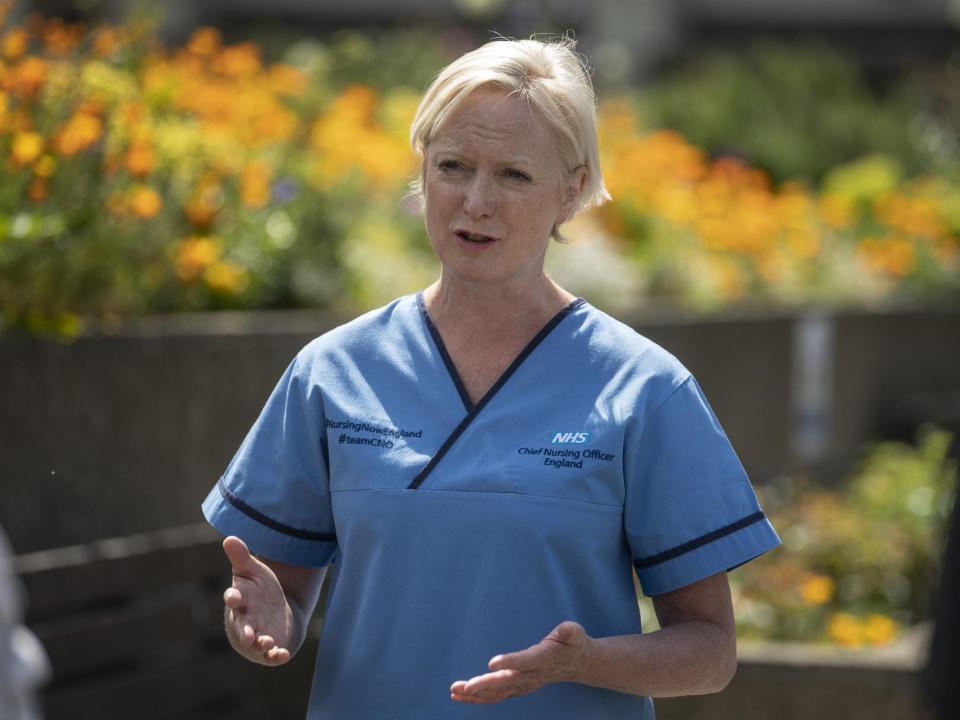NHS chief nurse sets out £180m plan to boost nursing workforce ahead of winter

England’s chief nurse has set out plans to spend up to £180m to boost NHS nurse numbers ahead of a second wave of coronavirus.
Ruth May said the health service would need more nurses to avoid operations being cancelled this winter.
In her first interview since the pandemic began, she revealed 6,500 international nurses were already “on the order book” to join the NHS, with dozens of nurses having travelled to the UK from India in the last two weeks.
The Department of Health and Social Care has given the NHS a £28m pot to boost international recruitment and cover costs such as flights, airport transfers and accommodation for nurses to help get them into the UK. It will also be looking to agree deals directly with governments of other countries to create pipelines for future recruits.
The chief nurse revealed 2,500 retired nurses who returned to the NHS to help it cope during the first wave of the virus were now being supported to stay permanently.
In total, 13,000 nurses joined an emergency register set up by the Nursing and Midwifery Council earlier this year, with 6,000 nurses having completed employment checks to get them back doing shifts. They will all be helped by Health Education England to convert to nursing permanently if they wish.
On top of this, the NHS will be spending almost £2m to recruit 7,500 healthcare assistants (HCAs) to work on wards alongside nurses. Trusts have been told to reduce HCA vacancies to zero.
Hospitals are also being encouraged to spend an extra £150m on existing nurses to help boost their training and skills, in an effort to persuade them to stay in the NHS.
Speaking to The Independent, Ruth May said the coronavirus crisis had been one of the hardest points of her career but that she was proud of how nurses had stepped up to the challenge.
“Nurses were at the forefront of the Covid-19 response, they have worked so hard,” she said. “The public have seen the breadth and depth of what nurses and midwives can do.
“I know they will, as a profession, step up yet again for the challenging few months we’ll no doubt have.”
The former theatre nurse worked two shifts at the London Nightingale hospital as well as in services in Ipswich, Colchester and in care homes.
“It was tough when I did my shifts on the frontline,” she said. “I won't ever forget seeing those patients. I won't ever forget being dressed in full PPE caring for those patients on ventilators, it will live with me for the rest of my days.
“It was hugely emotionally hard labour, but also hugely motivating.”
She added: “In our preparation for winter, we need to continue to look after the nurses we’ve got, to retain them, recruit more from our domestic supply and then of course, really get going as the borders start to open up on international recruitment.
“We don’t want to stop elective work. We want to make sure we continue to do that, where we can, however much we can, throughout the winter, and therefore we are going to need more nurses.”
She said while recruitment worked best at a local level, the NHS would be looking to lead efforts on agreeing deals with other countries at a national level.
“International nurses have been with us since the very start of the NHS, I'm grateful to every one of them.
“We are now beginning to see some international markets reopen and some international nurses have travelled to the UK to join the NHS in the past few weeks.
“We want trusts to get them in. It works much better locally, and we'll support them to do it.
“What we want to do is build on that and really put some weight behind it.”
She recently welcomed 23 nurses from India who arrived in the UK to join the NHS in Sheffield.
“We have an order book of over 6,500 in the pipeline,” she added.
Overall, the NHS is hoping to increase the numbers of international nurses recruited by 41 per cent, or 2,400 each year for four years.
Ms May said she understood the ethical concerns around recruiting nurses from other countries saying: “It is really important to do this ethically. It would be morally wrong if we didn’t. I am confident that we will.”
Earlier this week, she wrote to all chief nurses in the NHS setting out the plans to recruit more nurses ahead of winter and details of the packages of support to boost nursing recruitment to help achieve the government’s target of 50,000 more nurses in the NHS by 2024.
She said: “We know chief nurses in hospitals prepare for winter every year. They’ve put a lot of personal leadership into their organisations over this last six months. And my gosh I’m asking them to do the same again for the next six months.”
Ms May added: “We will no doubt see that nurses will be in the forefront of the response during winter, and that’s exactly why we want more nurses, that’s why we’re asking people to join our profession. We don’t just want people to clap for nurses, we want people to become a nurse.”
There are around 320,000 nurses working in hospitals and NHS community services in England. Before the pandemic, the number of vacancies was above 40,000. It has fallen since then and the NHS now hopes the extra recruitment will lead to a drop in vacancies to around 30,000, with those gaps covered by temporary staff.
Read more
Coronavirus: Hospitals told not to test staff or patients for Covid-19
Coronavirus: Boris Johnson says UK 'now seeing a second wave coming in'
UK coronavirus daily cases rise above 4,000 for first time in four months as 27 die

 Yahoo News
Yahoo News 